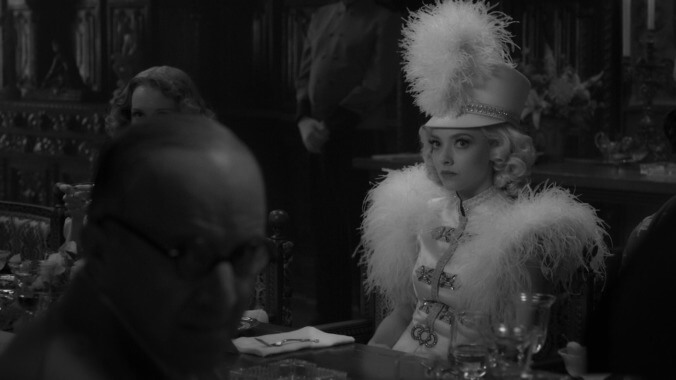It’s the spring of 1940. The alcoholic screenwriter Herman J. Mankiewicz (Gary Oldman) has come to a secluded ranch outside of Victorville, California to write his masterpiece, a scathing portrait of the newspaper magnate William Randolph Hearst that will eventually be known as Citizen Kane. Orson Welles, the boy wonder actor-director, is nowhere to be found. As Mankiewicz (whom everybody calls “Mank”) lies in bed with a broken leg, he remembers the days when he was the drunken wit of Hearst’s inner circle and a frequent guest at San Simeon, the palatial estate where the tycoon’s movie-star mistress, Marion Davies (Amanda Seyfried), hosted the kind of celebrity and politico parties of which Tinseltown conspiracy theories are born.
The truth is that Mank has only been hired as a ghostwriter. He has come to the ranch straight from the hospital (one of the few personal misfortunes for which his drinking and gambling have not been to blame) and though he badly needs the money, he knows that this particular script might destroy what’s left of his flagging career. Still, Mank continues to dictate dozens of pages a day to his young English amanuensis, Rita (Lily Collins). Like the characters of Kane, who are haunted by young ladies with white parasols and beloved childhood sleds, he is addicted to retrospection. It’s only later that we come to realize that he is suffering from a condition that is all too familiar: the long-term, post-traumatic effects of election brain.
Which is to say that, for a movie that’s nominally about Citizen Kane, one of the greatest artworks on the subject of memory and lost time, Mank is very invested in the forgotten 1934 California gubernatorial election and that critical commodity known as “timeliness.” For David Fincher, the king of the digital control freaks, it’s all part of a tongue-in-cheek experiment in anachronism: the staginess, the gloomy black-and-white cinematography, the archaically compressed mono sound, the cutesy faux cue marks and film scratches that indicate nonexistent reel changes. If such perverse post-modern quirks seem essential to Mank, it’s because they are sometimes the only things keeping this quasi-biopic together.
Among the manifold ironies of this overtly political passion project (which was based on a decades-old script by the director’s father, the late Jack Fincher) is the fact it is both a catalog of Fincherisms and a very atypical work—a feature-length excuse for the master stylist of minutiae to clown on his usual hyperrealism by indulging in all of his favorite movie-movie affectations. The parading of influences via cameo, name-check, and homage goes far beyond the Kane-mania that was already obvious in the The Social Network. But while Mank succeeds on certain personal terms, it fails by largely conventional means. There are parts that bear an uncanny resemblance to the kind of awards-bait middlebrow drama usually essayed by BBC-trained hacks.
In its worst stretches, it is repetitive, muddled, and even dull, sagging under the thesis of its uncredited source material, “Raising Kane,” the notorious Pauline Kael essay that claimed that Mankiewicz was the true genius behind the film. The fact that this nearly book-length hit piece was completely discredited decades ago is arguably irrelevant; Fincher has devoted a sizable chunk of his career to the art of turning junky source material into great movies, and neither Zodiac nor The Social Network are exactly models of journalistic integrity. The problem is that Mank never transcends its borrowed cornball arc, depicting its title character as a genius in eternal conflict with villains and phonies like Hearst (Charles Dance, terrific), Louis B. Mayer (Arliss Howard, even better), and Welles (Tom Burke, blood-curdlingly bad).
But this is really a movie about the backstory behind the backstory, delivered in flashbacks that are announced with helpful typewritten sluglines like “EXT. MGM STUDIOUS – DAY – 1934 (FLASHBACK).” The occasionally mischievous pseudo-analog craftsmanship of these 1930s-set scenes—which extends from the tracking shots to the playful Reznor-Ross score—helps break up the dimly lit monotony of the ranch, even if their attempts to establish an emotional center for the film are sometimes clumsy. It’s worth noting that while Mank draws on “Raising Kane” for its characterizations and clash-of-personalities drama, the movie’s politics are exclusively its own. (Kael’s essay is, among other things, an anti-left-wing diatribe.)
If the film never manages to sell the grumpy Mank as an artistic hero, it does make him into a credible figure of disillusionment whose populist ideals fade with the failure of Upton Sinclair’s campaign for governor of California. There is a lot that can be read into this subplot about a socialist Democratic candidate defeated by a consortium of hegemonic media interests and a self-loathing writer’s complicity in astroturfed capitalist propaganda. Fincher’s films are filled with puppet masters, sociopaths, and cynical, fascist appeals, but this is about as close as he’s ever come to vocalizing his politics, with a kiss-off from Hearst that oozes the most menacing qualities of his style.
Still, the phoniness of Mank often gets in the way, as unintended clumsiness and miscasting undercuts the more deliberate and self-aware distractions. The ideas are there—something about authoritarian forces and studio notes, smuggled subject matter and creative self-gratification, and the fine line between movie magic and deception. But like Mank himself, they are searching for a purpose, bitterly lost in a mix of funereal atmosphere and retro glitz. For Fincher, this long-lost Hollywood is both a digitally simulated surface texture and a costume party; sometimes it resembles a Vanity Fair photo spread, sometimes a crypt. Here, even a hardened critic must defer to the immortal wisdom of the commentariat: Not every movie has to be Citizen Kane.





























![Rob Reiner's son booked for murder amid homicide investigation [Updated]](https://img.pastemagazine.com/wp-content/avuploads/2025/12/15131025/MixCollage-15-Dec-2025-01-10-PM-9121.jpg)











